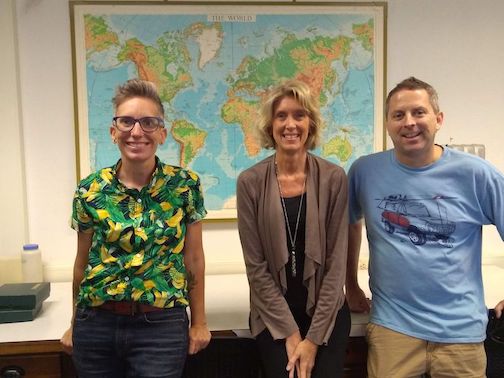Welcome to the Geography Department Web Site!
Geography is the study of the earth as the home of humanity - including both its human and physical characteristics. In their quest to understand the earth and its processes, geographers first ask where things are located, but more importantly, they seek to answer why these distributions occur.
Eratosthenes, a 3rd century B.C.E. librarian, is considered to be the first person to use the term “Geography”; however, Geography was practiced long before the ancient Greeks. People have always needed a spatial perspective in order to provide food and shelter for themselves. They also needed “mental maps” to travel and trade. So as a result, Geography as a discipline is as old as human history.
Contact Us
-
Naesse, Ireneinaesse@occ.cccd.edu(714) 432-5032
-
Quinn, Chriscquinn@occ.cccd.edu(714) 432-5028
-
Speed, Jaimejrossiter@occ.cccd.edu(714) 432-5863
-
Haley, Michellemhaley@cccd.edu
-
Surfas, Lesleylsurfas@occ.cccd.edu
-
Vu, Viennevvu22@occ.cccd.edu

Five Themes of Geography
Whether students enroll in the World Regional, Physical, Cultural, GIS, field courses, or any of the other Geography classes that we offer at Orange Coast College, your coursework will incorporate the five themes of Geography:
- Location
- Where is it located? Why is there?
- Place
- What is it like there?
- Human / Environment Interactions
- Human adaptations, modifications, dependence on the environment
- Movement
- How did it get there? Where is it going? Why did it move?
- Diffusion of people, goods, and ideas
- Regions
- Classification of areas that are based on similar characteristics
- Formal, functional, vernacular
Geographic Literacy
Geography continues to be an exciting and relevant area of study, particularly with the rapid globalization of today’s world. Yet, study after study indicates that many Americans, in particular, have a poor grasp of the world outside of the United States.
According to a National Geographic Survey in 2016, despite the recent wars in Afghanistan and Iraq, the War on Terror, and a catastrophic tsunami, many young Americans (ages 18 – 26), who attended or recently attended a college or university in the United States, could not correctly identify the following locations on a map:
- Saudi Arabia - 61% correct
- Iraq - 49% correct
- Iran - 45% correct
- Israel - 31% correct
In addition to poor geographical literacy, the study revealed that many young Americans (ages 18 – 26) also scored poorly on questions pertaining to global awareness:
- 49% correctly selected Mandarin Chinese as the primary language that is spoken by the most people in the world.
- 71% believe that China is the largest trading partner of the United States (correct answer: Canada).
- 28% knew that the United States is bound by treaty to protect Japan if it is attacked.
So, in order to remain competitive in an increasingly interconnected and global society, geographical literacy and global awareness is absolutely critical.
Remember, without Geography you’re nowhere!

